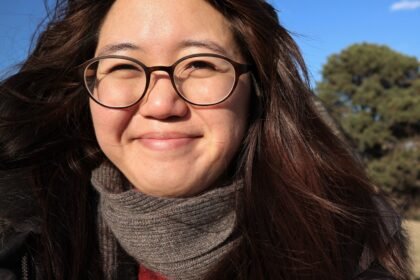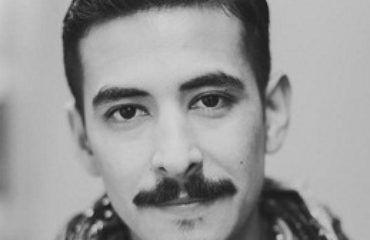
Ae Hee Lee is a Wisconsin-based poet whose debut collection, Asterism (Tupelo Press, 2024), was selected as the winner of the Dorset Prize by John Murillo. In Lee’s poems, heritage and belonging are examined rather than embraced. Visiting her father’s old home in Chungju, Korea, she asks the flowers growing there to “remember [her] from time to time.” Asterism travels through the three countries that have shaped her – Korea, Peru, and the US – chasing the spectres of all she has been and all she could have been. Her gift for sensual imagery is tempered by a relentless questioning of beauty and nostalgia. In a poem about the bureaucracy and anxiety of re-entry as an immigrant (“Chicago :: Re-entry Ritual”), she realizes that she must erase herself with each arrival, leaving room for “love, waiting/ at every side of a border.” In this interview, Lee discusses her journey in the literary world thus far, as well as the influences and concerns that drive her work.
FWR: I really resonated with the poems about the immigration process, the anxiety of going through border control, and the numerous hoops one has to jump through in one’s journey to secure visas and permanent residency. I am curious about how the language the immigration process subjects people to may have affected your own understanding of language.
AHL: Thank you so much for reading! I would say I’m glad you resonated with these poems, but at the same time, the immigration process, the anxiety, the paperwork, the money, and the hoops, can be so stressful that I don’t wish it on anyone.
I came to the U.S. as an international student to major in Literature and lived in the country with an F1 visa for almost 10 years, as I pursued grad school as well. I ended up meeting a person I could also call home here and applied for permanent residency, but I spent a big part of my adult life continually filling out and updating form after form to maintain my stay. This made me notice how the language of the immigration process and much of the political rhetoric around it stood directly in contrast with the language of literature and the arts that I had fallen in love with and had come to study.
In a sense, these experiences clarified for me the weight of language. Yes, there is language that seeks to control, hierarchize, and/or dehumanize, but there also exist languages that can resist the normalization of the former, reclaim, rehumanize, and love. So, I thought I wanted to be the kind of poet that strives to write in a language that is centered around such love and lives it out.
FWR: Food is a recurring theme and image in this collection — it becomes a vehicle for memory, tradition, and unconventional innovation, to name a few things. I am interested in whether and how food plays a role in your creative life today.
AHL: My mother used to say she liked watching me at the dinner table, because I looked happiest when I was eating. The act of eating, savoring and sharing meals, is something I find so much bliss in that any time I encounter a dish that is delicious beyond my expectations, I have the impulse to say “I love you” to whoever cooked it or is sitting with me. I also cook at home often – experimenting and trying out new foods, indulging in my curiosity about ingredients and tastes, inquiring about their journeys, their relationships with the hands that had made the dishes before me.
The way I experience food is not too different from my process for writing poetry, as I feel out the flavor and texture of each word I encounter outside or within the context of a line, and seek to learn about and from them. Since I was a kid, I kept a notepad with Korean, Spanish, and English words that I was fond of because of how they sounded or were interesting to me conceptually. But I would say food brings me a joy that feels more instinctual and immediate, while poetry is slower, and denser.
FWR: There are a plethora of forms used in Asterism. I am always interested in hearing writers talk about their process at a granular level. Would you tell us a little about how you chose the form for the poem “NATURALIZATION :: MIGRATION”?
AHL: When I write, I tend to have my poems lead me, and form is one of the things that the poem itself will make clear for me while drafting.
“NATURALIZATION :: MIGRATION” came to me at a pottery sale organized by college students. For this poem it felt right to be faithful to the sequence of thoughts and actions of the moment: to start with being present in the location, buying nothing, then move back to past instances of movement, to finally come to a reinterpretation of the word “naturalization,” hence the title.
“Naturalization” has always struck me as a strange word. While it’s largely defined as the legal process by which a foreigner becomes a citizen of a country, it also carries the implication of assimilation and a kind of belonging that is fixed and exclusive. This all feels at odds with how every living being exists in nature, always in movement, even when seemingly in the same place (the progression of plant roots, for instance).
While admiring one of the vases, I went back and forth between the urge to possess an inert object that made me feel grounded, the yearning to subscribe to the illusion of a “permanent” home, the thought I was not a vase person, and the consideration that I love and want to embrace the wanderer and wandering in me. And so, I felt the poem move too, which is why we arrived at a form resembling a river, the undulation of squirrels.
FWR: Do you remember when you came across the word “asterism”? And would you talk about why you chose that as the title of your book?
AHL: I confess I don’t recall the exact moment, since I often find many words by going down rabbit holes. What I do remember though is thinking how “constellation” didn’t feel quite right. A constellation is an officially acknowledged group of stars. In contrast, an asterism is a pattern or group of stars that can be observed by the naked eye. I didn’t grow up with a knowledge of constellations, but like many other people, I have stared at the stars and connected the shining dots to form figures of my own.
“Asterism” felt like it offered a more intimate relationship with the sky, and by extension, the world, and I realized the manuscript was just that. I came to understand the poems as a collection of patterns, personal and collective meaning-making, that arose from living in and reflecting the different countries and cultures I lived with.
That said, I also liked how asterism could mean a group of three asterisks (⁂), which is a symbol used to draw attention to following text, and that it brings to mind a field of aster flowers.
FWR: You’ve had three chapbooks come out in the past. What was that experience like? Did it help you find your readers?
AHL: I ended up with three chapbooks before turning to focus on finishing my first full length, because I often find myself jumping around projects. The result was Bedtime // Riverbed, Dear Bear, and Connotary, which are vastly different from each other; the first consists of Korean folk retellings rippling with “Hanja,” the second is a postapocalyptic epistolary romance, and the third is the chapbook that became the backbone for Asterism.
A backbone in itself is quite complex and beautiful, but with Connotary I started seeing a full body of work forming around it. While I can’t say for sure if I was consciously looking to build myself a platform, putting Connotary together gave me a more lucid idea of who at the moment I wanted to reach the most. Therefore, my hope for Asterism became that it may resonate with anyone who needs to hear that polycentric and transnational lives have a place in this world.
FWR: There are moments in Asterism where you appear to move very deliberately away from sentimentality. The endings of “GREEN CARD :: EVIDENCE OF ADEQUATE MEANS OF FINANCIAL SUPPORT” and “EL MILAGRO :: EDGES” come to mind. How did you arrive at the endings of these poems?
AHL: This is such an interesting question!
I confess there’s a bunch of cynicism in me that I fight against daily. A friend once shared that she mainly had a child leading her heart and an occasional elderly man that sometimes popped his head out to say something grumpy. In contrast, I would say I am mainly a grumpy old woman, but there’s a small poet inside that keeps murmuring “but…”
Even as a child, I felt rather unsatisfied with any perfectly-happily-ever-after I encountered in books. I do enjoy a good happy ending, but I’m suspicious of the perfectly-happily-ever-after, the insinuation that such an ending could legitimize and do away with all the struggles the characters had to go through. I think this translated into some of my poems, particularly the two you have mentioned. I won’t say too much about their endings so as to not impose my own interpretations into anyone’s reading of them, but for “GREEN CARD :: EVIDENCE OF ADEQUATE MEANS OF FINANCIAL SUPPORT” I sought to avoid certainty. For “EL MILAGRO :: EDGES” I thought to address the impossible prospect of fully understanding another’s experience.
The world is messy, and sometimes this can be cause for wonder, but I also simply wanted to acknowledge the very real feelings of resignation, helplessness, and loneliness that we experience as human beings dwelling in what seem like perpetually broken systems. Sometimes these emotions do feel like the end. However, I also like to think the very act of writing in the poetic language is a resistance against letting that “end” have the final word. For me, this apparent contradiction leaves itself open to the possibility of continuation, and hope.
Like yes, “What else could I do?” But… Here I am, writing. Yes, “It’s hard / and not so sweet.” But…!


